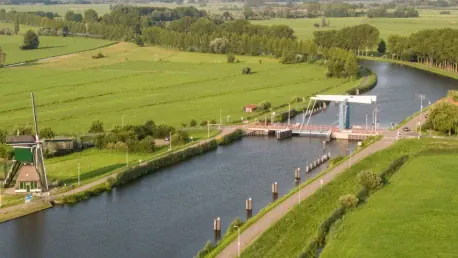In a landmark move for the aquaculture industry, Bakkafrost Scotland has commenced the installation of a 16-mile cable designed to deliver 100 percent renewable energy to its Applecross Recirculating Aquaculture System (RAS) facility. This endeavor transcends mere business advancement, serving as a potent testament to the company’s unwavering commitment to sustainable practices. By linking the facility to a nearby hydroelectric power scheme, Bakkafrost aims not just to reduce its carbon footprint but to revolutionize the way energy is utilized in aquaculture. Ian Laister, Managing Director of Bakkafrost Scotland, has spotlighted this initiative as central to the organization’s sustainability mission. He pointed out that the company’s efforts are geared towards slashing water usage and waste by a remarkable 90 percent. This is achieved through the application of renewable energy sources such as hydroelectric and solar power, alongside the use of recycled materials, thereby minimizing environmental impact.
This strategic shift towards green energy follows an extensive consultation process with local communities, underlining Bakkafrost’s thoughtful approach to stakeholder engagement. The project is poised to bolster economic stability in rural areas by creating employment opportunities and driving economic development. Specifically, the initiative promises to create 91 jobs in Wester Ross, making a significant contribution to the rural economy. Laister further emphasized that salmon farming is a vital employment source in these regions, encompassing a comprehensive value chain that includes everything from freshwater farming to marine processing. This creates a diverse range of job opportunities, guaranteeing steady income and promoting economic growth.
Bakkafrost’s ambitious renewable energy project is part of a growing trend in the aquaculture sector toward greater environmental responsibility. The company sets a bold precedent by integrating advanced sustainable practices and substantial investments in infrastructure. With its pioneering approach, Bakkafrost not only aims to lead in environmental stewardship but also places a strong focus on economic resilience within rural populations. The dual emphasis on ecology and socio-economic well-being positions Bakkafrost Scotland as a forward-thinking leader in sustainable aquaculture, likely making the company a model for future initiatives in the industry.
Community and Economic Impact
Bakkafrost Scotland has embarked on a groundbreaking project by installing a 16-mile cable to supply 100 percent renewable energy to its Applecross Recirculating Aquaculture System (RAS) facility. This initiative underscores the company’s deep commitment to sustainability. By connecting the facility to a nearby hydroelectric system, Bakkafrost aims to drastically cut its carbon footprint and transform energy use in aquaculture. Ian Laister, Managing Director of Bakkafrost Scotland, highlights this effort as key to the company’s sustainability goals, aiming to reduce water usage and waste by 90 percent through renewable energy and recycled materials.
This move aligns with extensive consultations with local communities, showing Bakkafrost’s dedication to engaging stakeholders. The project is set to boost economic stability in rural areas by creating jobs and fostering economic growth, with 91 positions expected in Wester Ross. Laister notes that salmon farming is crucial for local employment, spanning from freshwater farming to marine processing, creating a wide array of job opportunities.
Bakkafrost’s renewable energy venture is part of a broader trend in aquaculture toward environmental responsibility. The company’s innovative sustainable practices and infrastructure investments set a new standard. This approach not only focuses on environmental stewardship but also emphasizes economic resilience in rural areas. Bakkafrost Scotland is emerging as a forward-thinking leader in sustainable aquaculture, setting an example for future industry initiatives.









